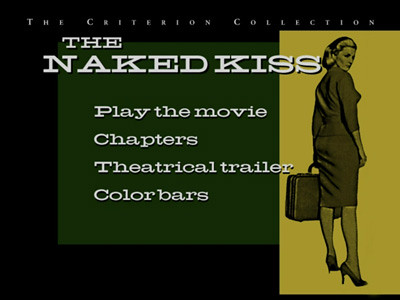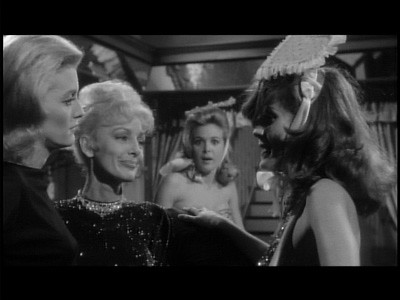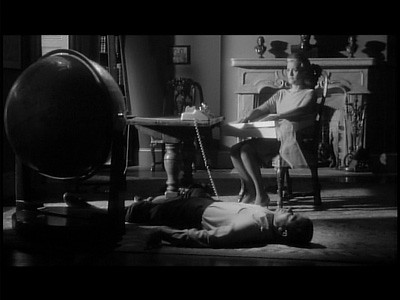
A fight breaks out in a posh apartment. Man versus woman. It's violent, and the man is on the defensive. As this is a film, the image cuts to his point-of-view, putting the audience in the shoes of the attacked as he fights back. One of his puny blows connects and knocks the hair right off the woman's head. She's wearing a wig and is completely bald underneath. This just enrages the woman more, and she beats the man down, screaming how she only wants what is hers, and that's a mere $75.
When the fight is done, she goes to a mirror, reapplies her wig, and reapplies her make-up. As the opening credits of The Naked Kiss roll over the top of the scene, its heroine, Kelly--played by she of the statuesque name and gait, Constance Towers--reasserts her femininity. The femme fatale role, one that traditionally sees women using their womanly wiles to assert more masculine control, has been one that has been forced one her--or at least the mark of it has. They can shave her head, but they can't make her less of a lady.
The opening of The Naked Kiss is one of the strangest and most memorable in all of cinema. Written, directed, and produced by Samuel Fuller in 1964, it's a pulpy romp with an abundance of rough edges. Even for Fuller, The Naked Kiss is an odd, grotesque, gritty picture--so much so, in fact, it's almost more interesting than it is good. Yet, like the filmmaker himself, who is feeling his oats as an independent after years of tearing at the seams of the studio system, it has an unflinching sense of self that is impossible to look away from.
Immediately after this beginning scene, The Naked Kiss jumps ahead two years. Kelly steps off the bus in a small town called Grantville under the guise of being a champagne saleswoman. The brand name and slogan of her bubbly is an intentionally lurid double entendre. "Angel Foam goes down like liquid gold, and comes up like slow dynamite." It's the first of many sleazy plays on words that Fuller indulges in, his tongue firmly planted in his cheek as he uses comic euphemisms as tools to expose the absurdity of puritanical cowardice. My favorite is when Kelly rents a room from the town spinster, and the woman, played by Betty Bronson, commenting on the ornate four-poster in Kelly's bedroom, remarks that most people spend 1/3 of their life in bed. Kelly raises an eyebrow, the look of "Oh, yeah? If you only knew."
Within minutes of landing in Grantville, Kelly cozies up to the local police detective, Griff (Anthony Eisley), who becomes her first client before telling her to get out of his burg. He recommends a brothel across the river, Candy's, where the girls dress in skimpy costumes and sell "bon-bons." Here, David Lynch was taking notes for One-Eyed Jacks in Twin Peaks. In fact, a lot of Lynch's themes regarding the darker underbelly of suburbia could possibly have originated with The Naked Kiss. For Griff, degeneracy belongs in the next town over, not in Grantville.
Except something about the wholesomeness of the suburb, or maybe in the false do-gooder cop's transparency, resonates with Kelly and she decides to settle there and give up the professional life. She gets a job as a nurse in the local hospital working with handicapped children. This hooker's heart of gold practically has magical, redemptive powers. She brings joy and inspiration to the kids, and her worldly wisdom comes in handy when small-town girls get into trouble they are ill prepared to deal with. Griff doesn't trust that Kelly has truly changed, and he's doubly suspicious when she catches the eye of his buddy Grant (Michael Dante), whose family founded the town and lent it their name. Grant saved Griff's butt in Korea, and he's a pretty swell dude, buying gifts for everyone on his fancy European vacations and funding the children's hospital. Even when Kelly confesses everything about her past to him, he doesn't toss her out. Instead, he proposes marriage.

There are times in The Naked Kiss where the storytelling is so choppy, my initial reaction the first time I saw it was that maybe scenes were missing from the print used for the DVD. It's a rough-hewn picture, with Fuller channeling Seijun Suzuki, doing away with pesky transitions or a need for the usual niceties of style that hide the more explicit and illicit details of your usual crime story. In her first scene with Griff, the cop finds Kelly reading The Dark Page, an old novel of Fuller's about tabloid journalism. Beyond being a cute inside joke (we also see the local theatre is showing Sam's previous film, Shock Corridor), it could also be seen as an indicator of what the auteur intends to do with The Naked Kiss. Like the tabloids, he wants to expose the stories that mainstream media is generally scared to touch.
Language is a big part of how the media sugarcoats the evil that lurks within the hearts of men, and Fuller is ready to get his mitts all over those scandalous euphemisms, too. Just about every dark act that he initially obfuscates in safe, acceptable terminology is eventually revealed for what it is, and Fuller drops any pretense and has his characters say it like it is. Thus, we hear words like "prostitution," "abortion," "pervert," and "molester." While perfectly acceptable today, these terms--even these topics--were not openly discussed in 1964. Fuller was three years ahead of Bonnie & Clyde and five before Easy Rider
Fuller always had a problem with disingenuous, hypocritical authority figures. Griff isn't his first corrupt cop, nor is this his first time digging out the rotten guts of America's governing body. As a metaphor for what ails us, having the descendent of Grantville's founding father be a child molester is not the most sophisticated and artful of constructs. My guess would be that Fuller was tired of playing around, and he was going to present it in the simplest terms possible, an opportunity uniquely afforded to him by the safe haven of a B-genre picture. The title of the film is as bare as it can be. A naked kiss, as Kelly explains, is the kiss of a pervert, the taste of it revealing all the decay and decrepitude he's got buried inside him. This movie is Fuller planting that very kiss on us, breaking down the illusions of American morality. Our heroes are empty wardrobe dummies, medals pinned on a hollow body, a helmet worn on an absent head--just like the totem of the fiancé Kelly's landlady always hoped would return from WWII. (Was that the last time this type of American figure made sense to Fuller?)

The Naked Kiss's subversion of cinematic tradition goes even further with its depiction of Kelly. The redemption of the femme fatale is rare, as she is too upsetting to the status quo for the men to let her survive. In the gender politics of the crime genre (given its near rural locale and that nearly all of the scenes take place in the daytime, The Naked Kiss is decidedly not noir), the male anti-hero can break away from a life of crime and seek a rebirth, and he will be afforded decisive moral actions to achieve this (bad guys will come for him, and he will take the bad guys down). Kelly faces way more skepticism than any of her male counterparts ever would. A fallen woman is not allowed to get up. Who will society believe? Its handsome, rich, male benefactor, or a dirty whore?
Fuller has a greater faith in womanhood and sees the importance of the gender's role in society. It sounds trite, but for him, children are the fountain of society's innocence and the renewable resource by which we can reinvigorate our basic humanity. It's not for nothing that the children that Kelly works with are handicapped. They suffer special damage, need special care. It's all laid out in that bizarre duet Kelly has with the kids, the one that moves Grant with such force that he must sully its wholesomeness by making it the soundtrack of his latest destructive conquest. If the children are broken, then the entire system is broken, knocked to rubble by the over-privileged, self-serving powers-that-be. Kelly is the über-mother, protecting her children and encouraging them to reach their full potential. Despite, tragically, not being able to have her own the key to her salvation is remembering to be gentle, heeding Griff's advice to talk to the little girl who can exonerate her as if it were her own daughter. This is also why the unattended baby in the final shot attracts Kelly's attention even as she turns her back on the rest of the town. Even now that the people of Grantsville know the truth, they are still looking in the wrong direction, and it is up to the woman they've scorned to give the infant its rattle.
Perhaps it's the hard medicine that Fuller is administering that requires the harder delivery. Fearing his audience doesn't want to hear what he has to say, he turns The Naked Kiss into an unstoppable force. Like Constance Towers attacking the smug, self-involved madame, he's going to bowl us over and shove the dirty money in our mouth. Its strength is undeniable, and despite its lack of sophistication, The Naked Kiss is ridiculous fun. It's a tasty juice that's 90% pulp, and it's all the better for being so damn tangy.

No comments:
Post a Comment